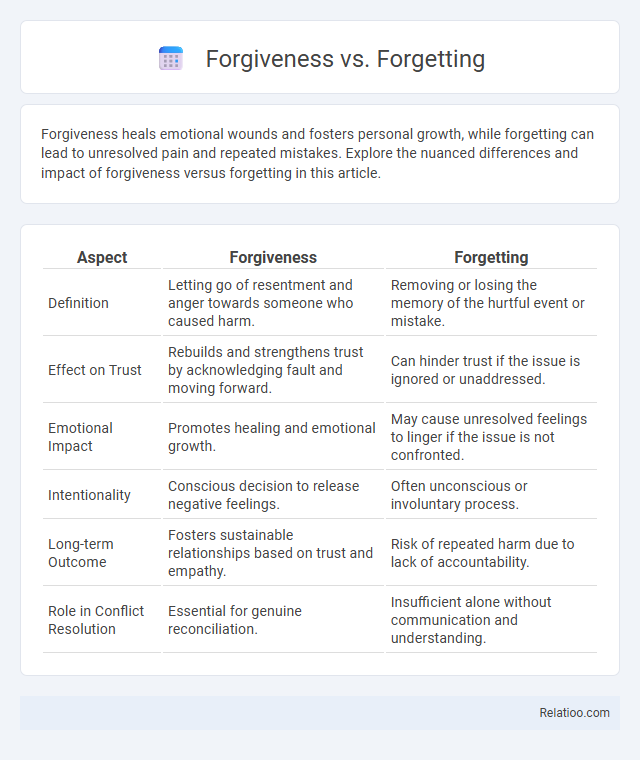Forgiveness heals emotional wounds and fosters personal growth, while forgetting can lead to unresolved pain and repeated mistakes. Explore the nuanced differences and impact of forgiveness versus forgetting in this article.
Table of Comparison
| Aspect | Forgiveness | Forgetting |
|---|---|---|
| Definition | Letting go of resentment and anger towards someone who caused harm. | Removing or losing the memory of the hurtful event or mistake. |
| Effect on Trust | Rebuilds and strengthens trust by acknowledging fault and moving forward. | Can hinder trust if the issue is ignored or unaddressed. |
| Emotional Impact | Promotes healing and emotional growth. | May cause unresolved feelings to linger if the issue is not confronted. |
| Intentionality | Conscious decision to release negative feelings. | Often unconscious or involuntary process. |
| Long-term Outcome | Fosters sustainable relationships based on trust and empathy. | Risk of repeated harm due to lack of accountability. |
| Role in Conflict Resolution | Essential for genuine reconciliation. | Insufficient alone without communication and understanding. |
Introduction to Forgiveness and Forgetting
Forgiveness involves consciously letting go of resentment or anger toward someone who has caused harm, promoting emotional healing and peace. Forgetting, by contrast, means the loss or absence of memory about the offense, which does not necessarily imply emotional resolution or reconciliation. Understanding the distinction is crucial, as forgiveness requires active decision-making, while forgetting often occurs passively over time.
Defining Forgiveness: What It Truly Means
Forgiveness means consciously choosing to release feelings of resentment or vengeance toward someone who has caused harm, without necessarily excusing the wrongdoing or forgetting the event. It involves emotional healing and letting go of negative emotions to restore inner peace and promote personal growth. Unlike forgetting, which implies erasing memories, forgiveness acknowledges the pain while fostering empathy and reconciliation.
The Concept of Forgetting: Myths and Realities
The concept of forgetting in forgiveness is often misunderstood, as it does not imply erasing memories but rather diminishing the emotional impact associated with past hurts. Forgetting is a psychological mechanism that can aid healing by reducing the intensity of negative feelings without negating the significance of the experience. Myths that equate forgetting with weakness or dismissal overlook how selective memory processing facilitates emotional resilience and genuine forgiveness.
Psychological Benefits of Forgiveness
Forgiveness offers significant psychological benefits by reducing stress, anxiety, and depression, promoting emotional healing and mental well-being. Unlike forgetting, which involves erasing the memory of a hurtful event, forgiveness allows you to acknowledge the pain while releasing negative emotions, fostering resilience and healthier relationships. Embracing forgiveness can lead to increased empathy, improved self-esteem, and a greater sense of inner peace.
The Challenges of Truly Forgetting
Truly forgetting a wrong involves complex cognitive and emotional challenges, as the brain often retains memories tied to significant pain or trauma. While forgiveness allows emotional release and healing, forgetting demands the suppression or alteration of memory, which is rarely complete or permanent. Neuroscientific studies reveal that memories linked to strong emotions are deeply encoded, making the act of forgetting a difficult neurological process distinct from forgiveness.
Is Forgiveness Possible Without Forgetting?
Forgiveness does not require forgetting past hurts; it involves releasing resentment and choosing to move forward despite the memory of the offense. Your ability to forgive is often strengthened by acknowledging the event's impact without erasing it from your mind. This balance allows healing and personal growth while maintaining awareness of lessons learned.
Forgiveness vs Forgetting: Key Differences
Forgiveness involves consciously letting go of resentment or anger towards a person or situation, while forgetting refers to the inability or decision not to recall the event altogether. Forgiveness is an active, intentional process promoting emotional healing and reconciliation, whereas forgetting is passive and often beyond control, related to memory function. Understanding these key differences highlights that forgiveness does not require erasing memories but rather changing the emotional response to them.
Healing and Moving Forward: Which Approach Works?
Forgiveness promotes emotional healing by releasing resentment and fostering inner peace, while forgetting can sometimes hinder healing by ignoring the lessons learned from past experiences. Choosing forgiveness allows individuals to confront pain, enabling genuine growth and healthier relationships. Moving forward effectively requires embracing forgiveness rather than forgetting, as it supports resilience and long-term mental well-being.
Common Misconceptions Explained
Forgiveness often gets confused with forgetting, but they are distinct processes: forgiveness involves consciously letting go of resentment, while forgetting means erasing the memory of the offense, which doesn't always happen. Many believe forgiveness requires reconciliation, yet you can forgive without restoring a relationship, prioritizing your emotional healing instead. Understanding these common misconceptions empowers you to choose forgiveness for your peace without feeling pressured to forget or rebuild trust prematurely.
Practical Steps for Cultivating Forgiveness Without Forgetting
Cultivating forgiveness without forgetting involves consciously acknowledging the hurt while releasing resentment through mindful reflection and empathetic understanding. Practical steps include journaling emotions to process pain, setting healthy boundaries to prevent recurrence, and engaging in compassionate dialogue to foster healing and trust restoration. This approach maintains awareness of the offense to promote personal growth and informed decision-making without perpetuating bitterness.

Infographic: Forgiveness vs Forgetting
 relatioo.com
relatioo.com